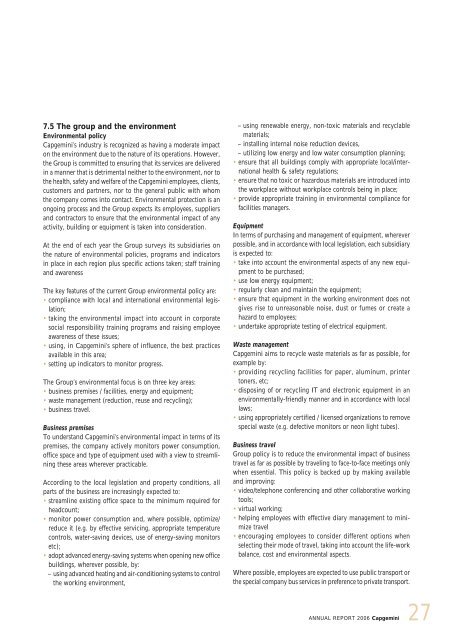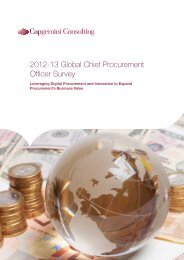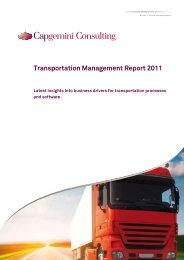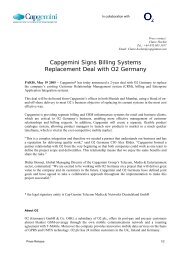You also want an ePaper? Increase the reach of your titles
YUMPU automatically turns print PDFs into web optimized ePapers that Google loves.
7.5 The group and the environment<br />
Environmental policy<br />
<strong>Capgemini</strong>’s industry is recognized as having a moderate impact<br />
on the environment due to the nature of its operations. However,<br />
the Group is committed to ensuring that its services are delivered<br />
in a manner that is detrimental neither to the environment, nor to<br />
the health, safety and welfare of the <strong>Capgemini</strong> employees, clients,<br />
customers and partners, nor to the general public with whom<br />
the company comes into contact. Environmental protection is an<br />
ongoing process and the Group expects its employees, suppliers<br />
and contractors to ensure that the environmental impact of any<br />
activity, building or equipment is taken into consideration.<br />
At the end of each year the Group surveys its subsidiaries on<br />
the nature of environmental policies, programs and indicators<br />
in place in each region plus specific actions taken; staff training<br />
and awareness<br />
The key features of the current Group environmental policy are:<br />
compliance with local and international environmental legislation;<br />
taking the environmental impact into account in corporate<br />
social responsibility training programs and raising employee<br />
awareness of these issues;<br />
using, in <strong>Capgemini</strong>’s sphere of influence, the best practices<br />
available in this area;<br />
setting up indicators to monitor progress.<br />
The Group’s environmental focus is on three key areas:<br />
business premises / facilities, energy and equipment;<br />
waste management (reduction, reuse and recycling);<br />
business travel.<br />
Business premises<br />
To understand <strong>Capgemini</strong>’s environmental impact in terms of its<br />
premises, the company actively monitors power consumption,<br />
office space and type of equipment used with a view to streamlining<br />
these areas wherever practicable.<br />
According to the local legislation and property conditions, all<br />
parts of the business are increasingly expected to:<br />
streamline existing office space to the minimum required for<br />
headcount;<br />
monitor power consumption and, where possible, optimize/<br />
reduce it (e.g. by effective servicing, appropriate temperature<br />
controls, water-saving devices, use of energy-saving monitors<br />
etc);<br />
adopt advanced energy-saving systems when opening new office<br />
buildings, wherever possible, by:<br />
– using advanced heating and air-conditioning systems to control<br />
the working environment,<br />
– using renewable energy, non-toxic materials and recyclable<br />
materials;<br />
– installing internal noise reduction devices,<br />
– utilizing low energy and low water consumption planning;<br />
ensure that all buildings comply with appropriate local/international<br />
health & safety regulations;<br />
ensure that no toxic or hazardous materials are introduced into<br />
the workplace without workplace controls being in place;<br />
provide appropriate training in environmental compliance for<br />
facilities managers.<br />
Equipment<br />
In terms of purchasing and management of equipment, wherever<br />
possible, and in accordance with local legislation, each subsidiary<br />
is expected to:<br />
take into account the environmental aspects of any new equipment<br />
to be purchased;<br />
use low energy equipment;<br />
regularly clean and maintain the equipment;<br />
ensure that equipment in the working environment does not<br />
gives rise to unreasonable noise, dust or fumes or create a<br />
hazard to employees;<br />
undertake appropriate testing of electrical equipment.<br />
Waste management<br />
<strong>Capgemini</strong> aims to recycle waste materials as far as possible, for<br />
example by:<br />
providing recycling facilities for paper, aluminum, printer<br />
toners, etc;<br />
disposing of or recycling IT and electronic equipment in an<br />
environmentally-friendly manner and in accordance with local<br />
laws;<br />
using appropriately certified / licensed organizations to remove<br />
special waste (e.g. defective monitors or neon light tubes).<br />
Business travel<br />
Group policy is to reduce the environmental impact of business<br />
travel as far as possible by traveling to face-to-face meetings only<br />
when essential. This policy is backed up by making available<br />
and improving:<br />
video/telephone conferencing and other collaborative working<br />
tools;<br />
virtual working;<br />
helping employees with effective diary management to minimize<br />
travel<br />
encouraging employees to consider different options when<br />
selecting their mode of travel, taking into account the life-work<br />
balance, cost and environmental aspects.<br />
Where possible, employees are expected to use public transport or<br />
the special company bus services in preference to private transport.<br />
ANNUAL REPORT 2006 <strong>Capgemini</strong><br />
27















